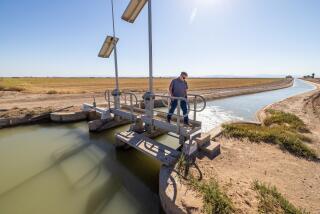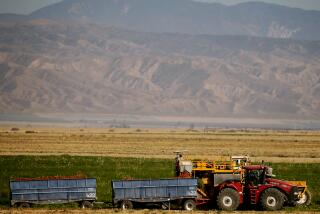MWD Taps Rice Farms for Water
- Share via
COLUSA, Calif. — Facing a sharp reduction of water from the Colorado River, the Los Angeles-based Metropolitan Water District has quietly negotiated options with Sacramento Valley rice farmers on enough water to supply 1 million Southern California households for a year.
Unlike California’s Imperial Valley, the economically hard-pressed rice growers here are open to the idea of selling water to coastal cities, at least for the short term. Earlier this week, the Imperial Irrigation District resisted state and federal pressure and rejected a proposed water transfer to San Diego that would have helped meet California’s obligation to cut back on its use of Colorado River water.
“I think most of our landowners would be amenable to sharing some water,” said rice farmer Bruce Rolen, board member of the Glenn-Colusa Irrigation District, Northern California’s largest water agency with 170,000 irrigated acres under its control.
“It could not have been more different than the attitude we faced in Imperial,” said Timothy Quinn, Metropolitan Water District president for state water project resources.
Negotiations with the rice growers began in September when Metropolitan Chief Executive Ron Gastelum instructed Quinn to approach 14 regional water districts here about water-options contracts “as a hedge strategy against the possibilities of shortfalls from the Imperial Valley.”
To Quinn’s surprise, almost all of the water districts quickly embraced the idea, reaching tentative agreements within a month. Since then, Quinn said, two other Northern California districts have approached him offering to sell water.
With the breakdown of the Imperial Valley deal, the Northern California rice farm options now look particularly farsighted.
Such is the complexity of California’s ground-water supply system. When sources dry up in the irrigated desert near the Mexican border, the effects can be felt 600 miles north on snowy Mt. Shasta, headwaters of the Sacramento River that supply the hardpan clay soils in Colusa, Glenn and Butte counties.
The amount of water involved, about 205,000 acre-feet, is more than the amount at stake in the final version of the Imperial-San Diego water transfer. The conclusion of the agreements with the rice farmers is key to the Southern California water agency’s contention that it has a two-year supply of water available even if the federal government makes good on its threat to cut Colorado River supplies.
Metropolitan officials agreed to pay more than $2 million for options on the rice-land waters, amounting to about $10 per acre-foot.
The farmers will get that money even if the MWD never lays claim to the water.
In the event it does need the water, Metropolitan will pay the Sacramento Valley districts an additional $90 an acre-foot, pumping $20 million into the beleaguered local farm economy here.
The price for the Northern California water is a lot less than the $258 an acre-foot the Imperial Valley would have received in the deal it rejected.
But given the current low commodity prices for rice and heavy competition from foreign growers, the option price was attractive to Rolen and other local farmers.
Many here had already stopped planting portions of their land because of a 2001 deal to sell water to Westlands, a large Central California water district that had run dry.
In the Westlands deal, Rolen, 48, a third-generation California farmer, let 174 of his 400 acres go fallow, for which he was paid about $30,000 calculated on the basis of the water he would not use to irrigate the land.
Rolen said he put all of the extra money back into his property, leveling his idle fields and investing in equipment.
“I imagine that 98% of the farmers here would do the same thing,” he said, surveying one of his rice field levees as a huge flock of sandhill cranes strutted a few hundred feet away.
However, some local businesses that depend on the farmers’ trade are not so sanguine about the effects of a water transfer.
To reassure local communities about third-party impacts, Quinn said MWD has offered to add a $5-per-acre-foot community service fee to the price it pays for the water.
It’s not enough to console Jerry Davies, a Colusa diesel fuel dealer.
“If nobody moves a wheel on a tractor,” Davies said, “We aren’t selling anything.”
Richard Bottini, owner of the John Deere farm equipment company here, also is nervous. “I worry that once the water is transferred it will set a dangerous precedent, especially after the Imperial Valley thing.”
One major difference is that the idea of idling farmland in order to slake the thirsts of coastal city dwellers does not offend rural sensibilities here the way it does in the arid Imperial Valley. There, farmers’ families struggled to make the desert bloom a century ago, and they have a hard time making sense of a deal that would require them to allow any of that land to revert to desert.
Colusa County farmers would have reacted the same way 20 years ago, Rolen said.
“If you had even mentioned water transfers the answer would not only have been ‘no’ but ‘hell no!’ But nowadays, we’ve been through a couple of these things, and we’ve reached a kind of reasonable comfort zone with the idea.”
But Donald Bransford, Glenn-Colusa Irrigation District chairman and a major local rice grower, cautions against comparisons between agreeable northerners and recalcitrant Imperial Valleyites.
The Imperial board, Bransford noted, balked at a deal lasting decades into the future, whereas the Sacramento Valley proposal is for only one year.
“If we were facing a long-term arrangement,” said Bransford, “I think you might get the same reaction up here that you have in the Imperial Valley.”
Bransford and others also think, however, that in a pitched political battle for water between their sparsely populated northern farm country and the urban coast, the farmers would end up losers.
As such, they speak a language here that would be virtual sacrilege in the Imperial Valley.
Said Bransford: “I truly believe that you are not going to put a wall up in the north state and prevent water from moving south. If you are not willing to cooperate, then the state is going to come and take your water anyway.”
More to Read
Sign up for Essential California
The most important California stories and recommendations in your inbox every morning.
You may occasionally receive promotional content from the Los Angeles Times.










